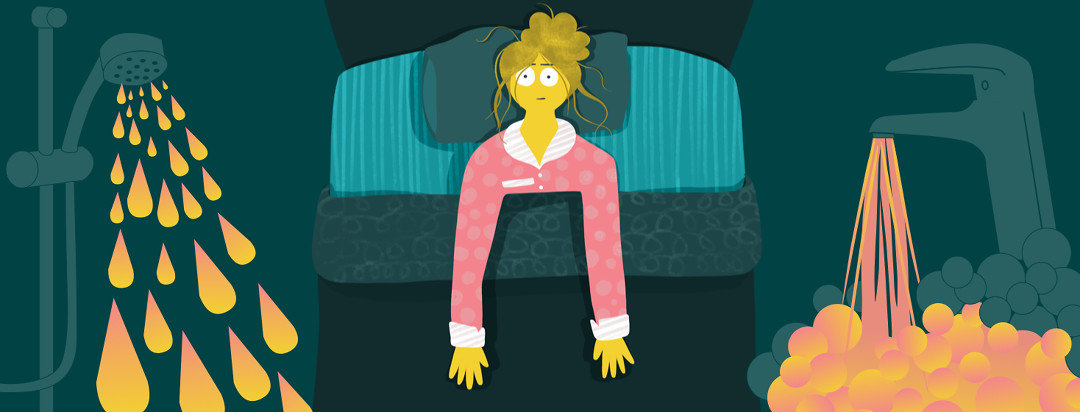The Difficult Small Choices of Chronic Illness
As I sit here thinking about the rest of my day, I’m trying to figure something out. Actually, I’m agonizing over a pretty big decision that is going to impact the rest of my day, maybe even tomorrow, too. Should I take a shower or not? Can I get by without one? What’s going to happen if I do take one? What might seem like a routine task can become a huge decision for someone suffering from a chronic illness like multiple sclerosis. For many of those living with MS, the smallest of choices can have the most significant results. One of the biggest differences between someone who has a chronic illness and someone who doesn’t is the impact that small “everyday” choices have on our lives.
Small choices can have a big impact
The showering decision is one of my favorite examples when trying to demonstrate what it’s like for people in my condition. I’ve discussed some of the perils that go along with showering in the past. Explaining to others that whether I shower or not can have a huge impact on my day is a great way to drive home the point that there are plenty of choices that most people make every single day that would impact someone like me. Taking a shower isn’t even a decision for a lot of people, it’s a routine they don’t even give a second thought to. For me though, if I take a shower, especially if it’s too warm or humid, that may end up being the end of my day.
The daily questions I have to ask myself
While a shower is a good example, that’s actually one of the bigger ones. Should I get up and go to the bathroom again? Do I want to cook a meal that may be more involved than I can really handle? Can I prepare myself that meal and still be able to prepare one for my dog? Should I do the dishes, which isn’t just about simply washing dishes, but also standing for a significant period of time by the sink? What kind of clothes am I going to wear today, will they be too complicated or too warm? Which cup am I going to use today, will it be too heavy or easily spillable? I’m supposed to meet up with a friend, have they been sick lately (my medication hampers my immune system and I can’t afford to get sick)? I’m in tremendous pain, what effect will that have on me if I have to talk to others? I feel pretty good, but am I really? Should I use my cane or not?
Considerations for different "simple" tasks
Those are just a few examples. As you can see, it’s a wide range of things to think about. Many of those decisions require more thought than most people would give because we need to break down each little component. Like the washing the dishes example: most folks can think about simply washing the dishes and the time and effort needed to do that. However, I need to factor in that I’m not only washing dishes, I’m standing while I’m doing it, and I have to take that into account. With MS, tasks that once seemed simple need to be broken down into individual components to be evaluated. It’s not as simple as “just doing the dishes” for me because the components of that “simple” task can affect me differently depending on how my body is doing that day.
My abilities can vary from day to day
A lot of it really varies from day-to-day. Are my hands too numb to properly hold items? Are my legs too weak to stand or walk for the length of time required? Am I too fatigued to finish the task? It’s more than that though. Not only is it a question of if I complete a particular task, but if I do, what will happen to me later?
Should I spend my energy now or later?
Will I be able to do something else I have planned for later that day? You’ve no doubt heard about MS fatigue and spoon theory. That plays a massive part in the decisions we make. Doing something now may rob me of energy to do something in the near future. If I wash those dishes, will I be able to make dinner later? Planning small details then takes on an important part of life, because if I don’t wash those dishes because I’m worried about making dinner, will I have anything to eat it on (suddenly, I am eating ramen out of the same pot I cooked it in)?
Making these choices isn't easy
There are a lot of considerations to make when living with a chronic illness. What may seem like small and insignificant choices can have a big impact on our daily lives. Whether we can physically accomplish these tasks, have the energy to do so, or have to worry about future tasks, making the right choice is important and not as easy as it might seem. When you see someone who battles a chronic illness like MS, keep in mind that they’ve made a lot of small and difficult choices to be there. Many of these decisions are ones that most people take for granted.
Thanks so much for reading and always feel free to share!
Devin
My Other Articles On MultipleSclerosis.net - Follow Me On Facebook

Join the conversation